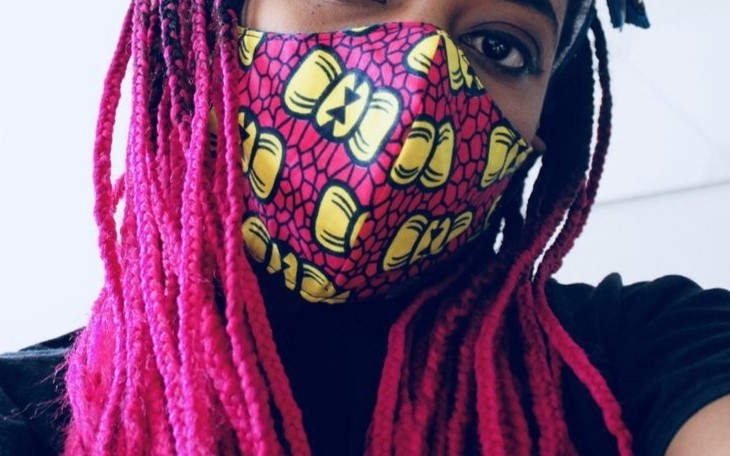Nov 12, 2020 | by Nick Aveling, Hand in Hand International

Rhoda, a tailor from Kenya who received Hand in Hand International’s livelihoods training, wears a facemask she produced during the coronavirus crisis.
Three months. That's how long it took the coronavirus to slash incomes, shutter businesses, and wipe out savings among millions of vulnerable women worldwide. Undoubtedly, many will find a way to rebuild. But in a world where economic resilience has been stretched to breaking point, SEEP member organizations have a duty to ask: are programs that focus exclusively on women’s economic empowerment enough, or does building back better require broadening our approach to include social elements whose outcomes aren't so easily reversed?
A few weeks back at the 2020 SEEP Annual Conference, participants from some 60 organizations gathered virtually to consider women’s economic and social empowerment (WESE) for a post-COVID-19 world in a Design Sprint Room hosted by Hand in Hand International, a London-based NGO working to help women beat the odds and succeed as entrepreneurs, in partnership with Women for Women International and CARE Netherlands. Across three breakout rooms and a huge diversity of opinion, four key themes emerged:
There was unanimous agreement on at least one subject: the disproportionate burden of unpaid care work shouldered by women increased significantly during the coronavirus crisis, leaving little room for productive activity of any kind, let alone sustained ‘economic empowerment’. In challenging contexts such as Afghanistan, said Women for Women International and others, women’s economic empowerment programs that target women exclusively won’t be sufficient to achieve true WESE. Programs will also need to include a male engagement component to reduce women’s burden of care.
Perhaps surprisingly, given humanity’s annus horribilis, the session wasn’t all doom and gloom. Even as COVID-19 devastated countless women-owned microbusinesses, it opened a window of opportunity to involve women in decision-making processes inside and outside of the home, participants suggested. Historically, NGOs have sought to boost women’s decision-making in the social, political and economic spheres. But participants argued development organizations should also look inwards. That means meaningfully involving women from target populations at the very outset of program design to understand and map their specific needs, ensuring they have access to levers of influence throughout program delivery, and building MEL systems that continuously assess whether WESE programs are fit for purpose.
Women’s overwhelming care burden and absence from program design are undoubtedly impediments to WESE. But participants noted another issue perhaps more prosaic but no less damning than the others: NGOs have favored vulnerable value chains (for example, perishables destined for export such as flowers or some fruit and vegetables). Resilience to major shocks on the scale of coronavirus – and smaller shocks, too – should be a necessary lens considered when embarking on value chain and market linkage activities for women, they argued. Hand in Hand International’s work supporting women to enter Afghanistan’s poultry value chain – which allowed them to continue working from home during lockdown – is only one such example. Tailoring, which enabled women to quickly pivot to PPE production, is another.
The group noted that quicker, more thorough needs assessments that better capture local context and clime were needed. What else? Mentoring for graduates of livelihoods programs, backed by rigorous accountability measures, that makes sure women continue to create value in functioning supply chains. Creative financial solutions, increased emphasis on organizational development, and tailored support to help members pivot as a given situation requires. These were just some of the technical programmatic improvements participants said would be key to developing an approach to WESE that will truly help women build back better.
Hand in Hand International is keen to keep the conversation going. To tell us how your organization is developing its approach to WESE, please get in touch.
Nick Aveling is Head of Communications and Hand in Hand International, a UK-based NGO working to help women beat the odds and succeed as entrepreneurs. Prior to joining Hand in Hand he reported local and international news for the Toronto Star and National Post, and worked as an editor and writer at Time Out London.
Categories: Economic Strengthening and Recovery Livelihoods Women and Girls English Blog Womens Economic Empowerment Blog 2020 WebinarsBlogs

1621 North Kent Street, Ste 900,
Arlington, VA, 22209
P 202.534.1400
F 703.276.1433
Website Photos: © mari matsuri
